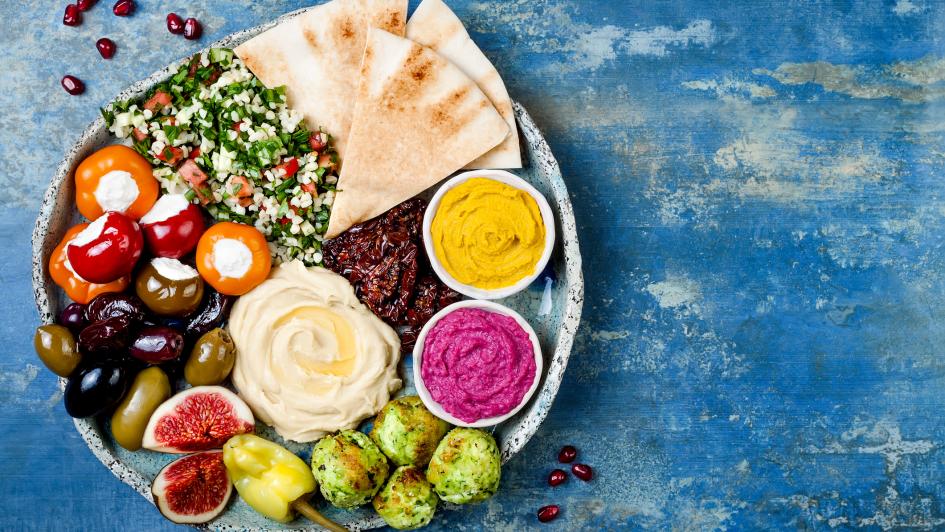4 Ways to Reduce Inflammation with Nutrition

Published
Inflammation is part of the body’s immune response and helps stimulate healing after an injury or threat.
This natural process is necessary, but when inflammation is ongoing and becomes chronic, it can contribute to many of the conditions commonly faced today, including diabetes, cardiovascular disease, digestive distress and pain. The good news is that nutrition has a profound impact on inflammation and is foundational to overall health and vitality.
Here are four tips to boost the anti-inflammatory potential of your diet:
Make your plate plant-centric. Focus on eating whole, unrefined foods. Eating more whole foods — like beans and lentils, whole grains, nuts, seeds, and fruits and vegetables — provides your body with important phytochemicals, vitamins, minerals and fiber that have been shown to reduce inflammation and enhance health. Research on the Mediterranean diet, which is based on foods typical of Mediterranean-style cooking, has shown that populations favoring plant proteins like beans, nuts, seeds and whole-soy foods (rather than a diet rich in animal proteins) are at less risk for inflammatory conditions. Consider using meat to flavor your meals, rather than as the main protein. When you do eat animal products, opt for pastured or grass-fed animals for a healthier fat balance.
Favor quality fats. Add small portions of foods high in healthy fats — such as avocado, nuts, seeds and olives — to meals. The omega-3 fats in foods like wild salmon, flaxseed, walnuts, hempseed and chia seeds work to lower inflammation directly. Avoid fried foods and trans fat (often found in pre-packaged cakes, cookies, pastries and other processed foods).
Swap refined grains and sugars for higher-fiber whole grains. This will help lower the glycemic load of a meal and promote a healthy blood sugar balance. Choose brown rice, quinoa, oats, teff or millet as a base, and add beans, vegetables and spices to create a satisfying whole grain bowl.
Nourish your gut microbiome with prebiotics and probiotics. Consuming a variety of high-fiber plant foods feeds the beneficial gut bacteria, which in turn help reduce overall inflammation. Including a small amount of probiotic-containing foods like raw, fermented vegetables (sauerkraut, kimchi, etc.) with meals helps enhance digestion and contributes to a healthy gastrointestinal (GI) tract.
Kory DeAngelo, MS, RDN, CD, is a clinical nutrition supervisor at Bastyr Center for Natural Health. Schedule an appointment at our Seattle or San Diego clinics today!
Body:
Inflammation is part of the body’s immune response and helps stimulate healing after an injury or threat.
This natural process is necessary, but when inflammation is ongoing and becomes chronic, it can contribute to many of the conditions commonly faced today, including diabetes, cardiovascular disease, digestive distress and pain. The good news is that nutrition has a profound impact on inflammation and is foundational to overall health and vitality.
Here are four tips to boost the anti-inflammatory potential of your diet:
Make your plate plant-centric. Focus on eating whole, unrefined foods. Eating more whole foods — like beans and lentils, whole grains, nuts, seeds, and fruits and vegetables — provides your body with important phytochemicals, vitamins, minerals and fiber that have been shown to reduce inflammation and enhance health. Research on the Mediterranean diet, which is based on foods typical of Mediterranean-style cooking, has shown that populations favoring plant proteins like beans, nuts, seeds and whole-soy foods (rather than a diet rich in animal proteins) are at less risk for inflammatory conditions. Consider using meat to flavor your meals, rather than as the main protein. When you do eat animal products, opt for pastured or grass-fed animals for a healthier fat balance.
Favor quality fats. Add small portions of foods high in healthy fats — such as avocado, nuts, seeds and olives — to meals. The omega-3 fats in foods like wild salmon, flaxseed, walnuts, hempseed and chia seeds work to lower inflammation directly. Avoid fried foods and trans fat (often found in pre-packaged cakes, cookies, pastries and other processed foods).
Swap refined grains and sugars for higher-fiber whole grains. This will help lower the glycemic load of a meal and promote a healthy blood sugar balance. Choose brown rice, quinoa, oats, teff or millet as a base, and add beans, vegetables and spices to create a satisfying whole grain bowl.
Nourish your gut microbiome with prebiotics and probiotics. Consuming a variety of high-fiber plant foods feeds the beneficial gut bacteria, which in turn help reduce overall inflammation. Including a small amount of probiotic-containing foods like raw, fermented vegetables (sauerkraut, kimchi, etc.) with meals helps enhance digestion and contributes to a healthy gastrointestinal (GI) tract.
Kory DeAngelo, MS, RDN, CD, is a clinical nutrition supervisor at Bastyr Center for Natural Health. Schedule an appointment at our Seattle or San Diego clinics today!

